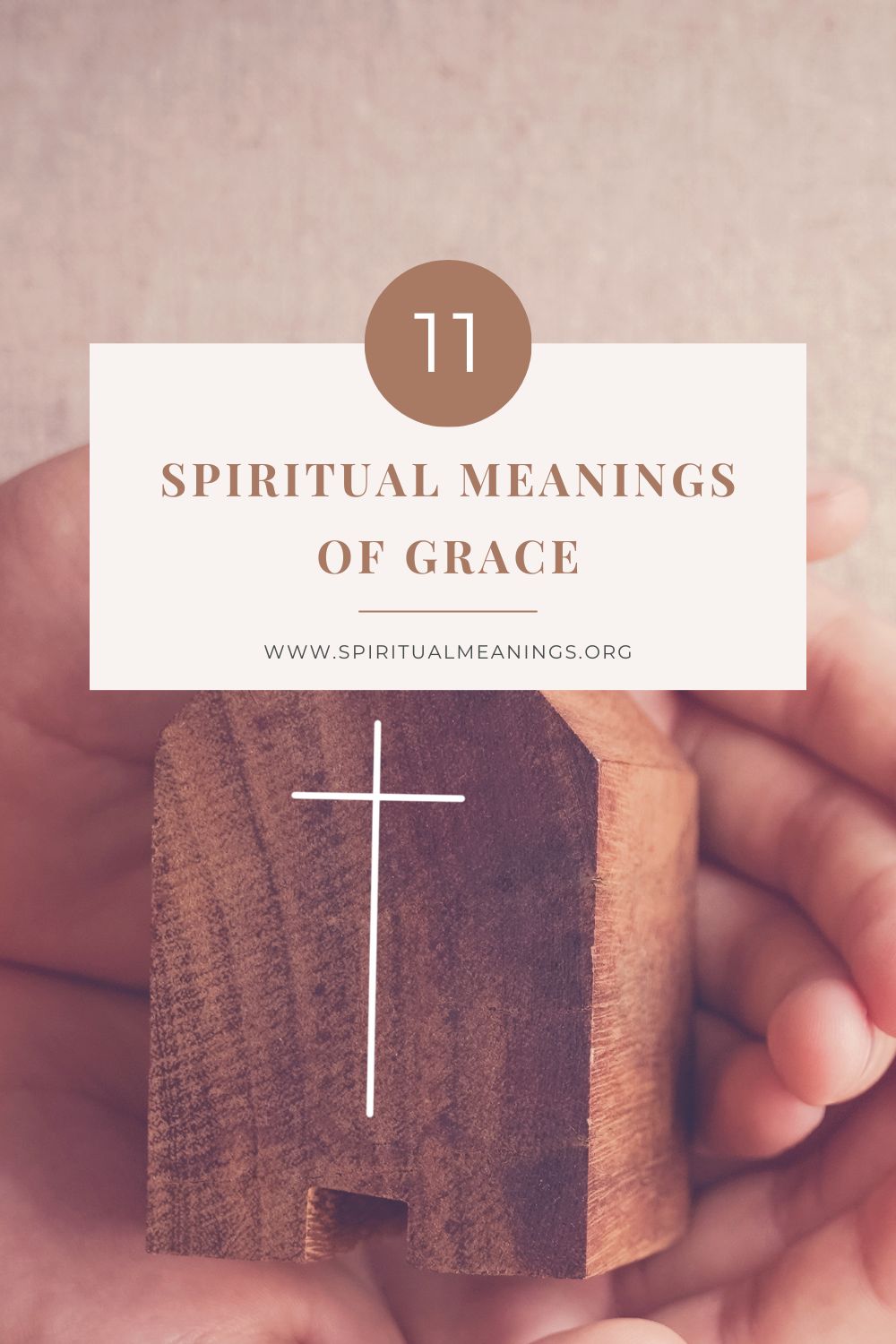Whether you are religious or merely spiritual without following an organized religion, the concept of Grace is an important one that can guide you in your actions and in your interactions with others.
However, it is not always an easy concept to understand, which means some people might not know exactly what it means – so to help, in this post, we discuss 11 spiritual meanings of Grace.
Grace Spiritual Meanings
1. The Christian meaning of Grace
Before we discuss other spiritual meanings of Grace, we need to start by talking about what Grace means in the Christian tradition since all other spiritual ideas about Grace stem from this.
The Grace of God is one of the central aspects of the Christian faith, and it’s also a complex theological question, but here’s a necessarily limited explanation of what it means.
According to Christianity, God made man in his image and gave us all free will.
This means we can choose to live according to God’s will, but it also means we can choose to follow our desires and the desires of the world and live in sin.
Those who live according to God’s will are destined to spend eternity in Heaven, while those who live in sin will suffer eternal damnation in Hell.
However, God also loves every one of His creations equally, and through His mercy, God can also choose to save some of those who do not deserve to be saved – and the bestowing of mercy upon those who don’t deserve it is the essence of God’s Grace.
Furthermore, in the ultimate act of divine mercy, love and Grace, God sent his own son Jesus Christ to Earth to die on the cross to save those who were not living in accordance with his will.
It then became the duty of those who know God to spread the word of God’s Grace to save those who continue to live in sin.
Of course, this is a vastly simplified version of a far more complex theological concept, and many thousands of books have been filled with detailed discussions of Grace down the centuries.
However, in essence, we can understand Grace as showing mercy and love to those who don’t deserve love or mercy, and this will allow us to explore some other spiritual meanings of the term.
2. Being merciful
If God’s Grace is related to showing mercy to those who don’t deserve it, you can still exemplify this ideal, even if you are not a Christian, by doing the same.
In spiritual terms, negative energy is harmful and undesirable, so we should do all we can to expel negativity from our beings.
However, if somebody wrongs you, it can be hard to let go of feelings such as anger, resentment and a desire for revenge.
At the same time, these are powerful sources of negative energy, so to live with Grace and expel these negative energies, we need to learn not to seek vengeance but to be merciful instead.
3. Forgiving people
The next step after being merciful and not seeking revenge is to learn to forgive people for the wrongs they do to us.
When somebody betrays you, hurts you or otherwise upsets you, if you hold onto the negativity this creates, you will carry the negativity with you, and it will continue to pollute your being and drive you towards more negative actions.
Instead, try to find it within you to forgive the person – which means genuinely forgiving them rather than just forgetting the wrong and leaving it in the past.
This way, you will release your negative energy and face the future in a happier and more positive frame of mind.
4. Mending relationships
If you have fallen out with a friend or argued with someone close to you, acting with Grace also means taking the first step to mend the relationship.
It doesn’t matter whose fault it was – you just need to swallow your pride and be the first one to try to patch things up.
Indeed, this is easier if you were to blame for the conflict because you can simply offer up the olive branch and ask for forgiveness.
It is more difficult if they were to blame, but this will make the gesture of Grace all the more powerful.
Rather than waiting for them to apologize and ask for forgiveness, if you take the initiative and forgive them first, this is an act of Grace in its purest form.
5. Loving people unconditionally
The Christian God loves His creations unconditionally, and whether or not you are a Christian, unconditional love also represents a supreme act of Grace.
Parents often love their children unconditionally, and there can often be strong bonds of unconditional love between siblings, even – or especially – if they sometimes fight.
However, it is when these bonds of love are tested that true Grace can be manifested because it means continuing to love somebody even when they might no longer deserve it.
6. Spreading positive energy
Maintaining your positivity and spreading your positivity wherever you go can also be seen as a kind of Grace.
Just by staying positive and rejecting any negativity, you will bring more positive energy to those around you.
The more positive energy there is, the more it will be spread around, so by doing this, you are playing your part in making the world just a little bit better every day.
7. Doing random acts of kindness
Something else you can do if you want to live with more Grace is to carry out random acts of kindness to those around you – and especially to strangers.
This could be something as simple as buying a cup of coffee for a homeless person or helping an elderly person across the road – but the possibilities are limitless.
However, the most important thing is that the act should be selfless, and you shouldn’t expect anything in return.
You might not even be thanked by the person, and depending on what you do for them, they might not even know it was you.
In fact, anonymous random acts of kindness are perhaps the purest form of Grace since you won’t receive thanks, and all you will get in return is the knowledge that you helped somebody and made them a little happier, even if just for a short moment.
8. Being thankful
Although receiving thanks for what you do is not always necessary, you should still always be thankful for everything you receive and everything you have.
In the Christian tradition, giving thanks to God before a meal is called “saying Grace”, and being more mindful of your gratitude and expressing it to other people when appropriate can also be considered a form of Grace.
If you are not a Christian, you can still give thanks for the gifts you receive from the universe, whether they come in the form of natural talents, good luck, opportunities or anything else.
For people who are spiritual but not religious, the form this takes doesn’t matter – but what is important is that you take the time to express your gratitude in your own way.
9. Being generous
Giving without the expectation of receiving is also a pure form of Grace, so this is another behavior that is to be encouraged.
However, when you do this, you need to consider your motivations carefully, because when we give something, deep down, we may expect something in return – perhaps not materially but in the form of preferential treatment or something similar.
Search within yourself for your true motives for being generous, and if you find that you are being truly selfless and expect nothing in return, then this is a pure form of Grace.
10. Praying for others
If you are religious, praying for others is a form of Grace, but even for the non-religious, keeping people in your thoughts and sending positive energy their way in whatever form your spiritual practices permit can also be considered a form of Grace.
11. Acknowledge and forgive your own shortcomings
Finally, Grace can also be inward-looking rather than outward-looking, and in spiritual terms, acknowledging and forgiving your own faults and shortcomings is another act of Grace.
None of us is perfect, but we need to learn to love ourselves and accept ourselves for who we are, so if you can face your mistakes, forgive yourself for them and learn to become a better person for your experiences, this is another way to practice Grace.
A selfless way to live your life
Whether you are Christian, have a different religion or are a spiritual person who doesn’t follow an organized religion, the concept of Grace is an important one to understand because it can help you live your life in a more positive and selfless way.
The essence of Grace is doing things for others and expecting nothing in return, whether that means showing mercy, forgiving people who have wronged you, showing generosity, loving unconditionally or simply carrying out random acts of kindness while expecting nothing back.











